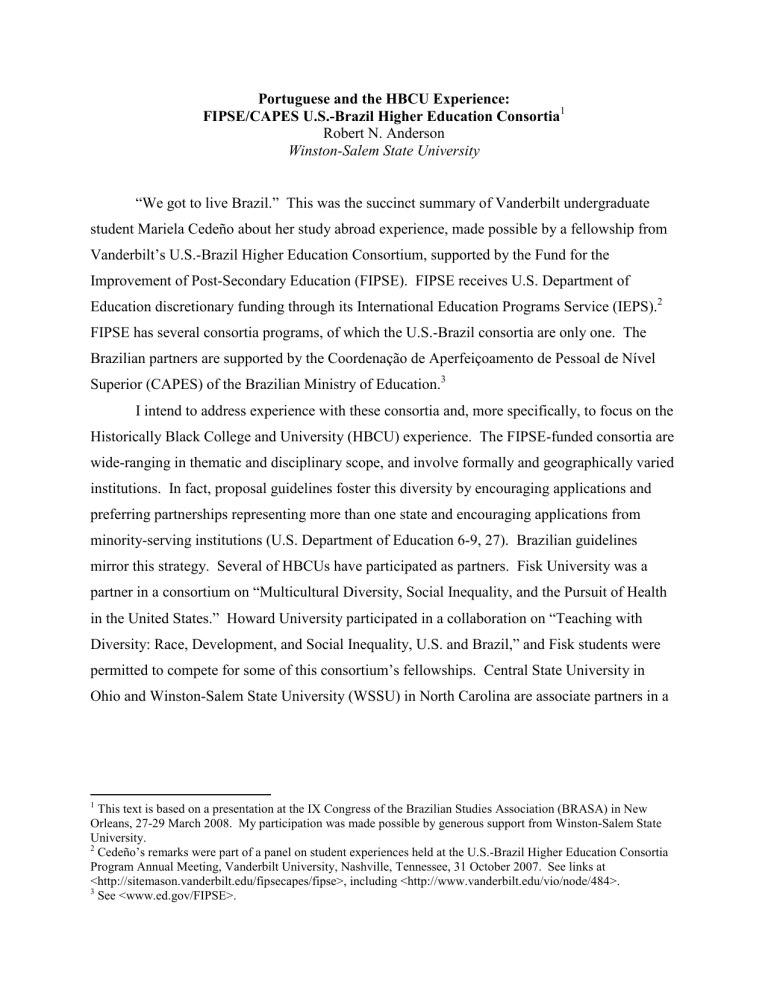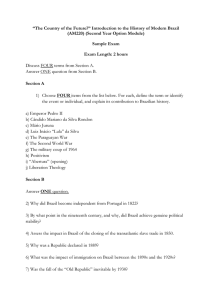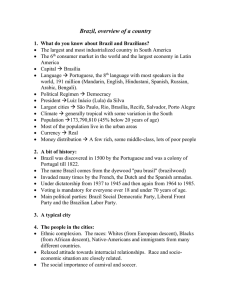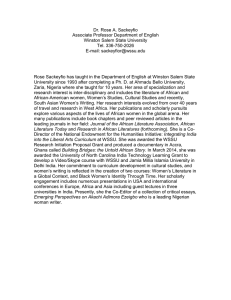Portuguese and the HBCU Experience: FIPSE/CAPES

Portuguese and the HBCU Experience:
FIPSE/CAPES U.S.-Brazil Higher Education Consortia
Robert N. Anderson
Winston-Salem State University
“We got to live Brazil.” This was the succinct summary of Vanderbilt undergraduate student Mariela Cedeño about her study abroad experience, made possible by a fellowship from
Vanderbilt’s U.S.-Brazil Higher Education Consortium, supported by the Fund for the
Improvement of Post-Secondary Education (FIPSE). FIPSE receives U.S. Department of
Education discretionary funding through its International Education Programs Service (IEPS).
FIPSE has several consortia programs, of which the U.S.-Brazil consortia are only one. The
Brazilian partners are supported by the Coordenação de Aperfeiçoamento de Pessoal de Nível
Superior (CAPES) of the Brazilian Ministry of Education.
I intend to address experience with these consortia and, more specifically, to focus on the
Historically Black College and University (HBCU) experience. The FIPSE-funded consortia are wide-ranging in thematic and disciplinary scope, and involve formally and geographically varied institutions. In fact, proposal guidelines foster this diversity by encouraging applications and preferring partnerships representing more than one state and encouraging applications from minority-serving institutions (U.S. Department of Education 6-9, 27). Brazilian guidelines mirror this strategy. Several of HBCUs have participated as partners. Fisk University was a partner in a consortium on “Multicultural Diversity, Social Inequality, and the Pursuit of Health in the United States.” Howard University participated in a collaboration on “Teaching with
Diversity: Race, Development, and Social Inequality, U.S. and Brazil,” and Fisk students were permitted to compete for some of this consortium’s fellowships. Central State University in
Ohio and Winston-Salem State University (WSSU) in North Carolina are associate partners in a
1
This text is based on a presentation at the IX Congress of the Brazilian Studies Association (BRASA) in New
Orleans, 27-29 March 2008. My participation was made possible by generous support from Winston-Salem State
University.
2
Cedeño’s remarks were part of a panel on student experiences held at the U.S.-Brazil Higher Education Consortia
Program Annual Meeting, Vanderbilt University, Nashville, Tennessee, 31 October 2007. See links at
<http://sitemason.vanderbilt.edu/fipsecapes/fipse>, including <http://www.vanderbilt.edu/vio/node/484>.
3
See <www.ed.gov/FIPSE>.
2
Biomedical Sciences Exchange. WSSU has also received two cycles of funding as a partner in
African Diaspora projects, for which I have been the WSSU project director.
The topics of these consortia are of logical interest to HBCUs as well as to Black students at majority white institutions both in the U.S. and Brazil. Whereas it is true that the consortia themes draw on and dovetail with the historical mission of these institutions, it is also interesting how, structurally and programmatically, FIPSE has improved Black student participation in study in Brazil in ways unrelated to themes of obvious interest. In tandem, CAPES has made it possible for Brazilian university students from public high schools and African-descended students to come to the U.S. to study. The results are institutional capacity building and the creation of a binational network of students with both academic and lived experience in a
Diasporic reality.
As for the Brazilian CAPES Fellows, my Brazilian partners have told me that, in addition to access to U.S. scholars and libraries, the greatest benefit has been the support for students without the means otherwise to study abroad, many of them African-descended. The partnership
in which Howard University participated echoed this sentiment.
In the case of WSSU’s first cycle, of the students that the U.S. partners received from Brazil, at least a third came from families whose resources could not sustain their university study, much less study in the U.S. In addition, over half of the students that WSSU received and about a quarter overall were of at least partial African descent.
On the U.S. side, the picture is similar: WSSU’s undergraduate student body is still about
80% African American. Although most of the students are middle class, most need some federal financial aid to attend university, and self-funded study abroad is unlikely without similar support. For most, FIPSE fellowships simply make the impossible possible:
If any opportunity to study abroad could have had that effect, then why is FIPSE significant, one might ask. FIPSE made the dream a reality. I had applied to two other international study programs prior to applying for the FIPSE program; I was denied one
4
The two projects have been “The African Diaspora in Brazil and the United States: A Comparative Approach,” with a focus on History and on Portuguese language instruction, and “The African Diaspora in Brazil and the United
States: Persistent Inequalities,” drawing on the social sciences, humanities, and education in the twentieth and twenty-first centuries. The other partners in the first grant were the University of North Carolina at Charlotte (U.S. lead), the University of South Carolina at Columbia, the Echo Foundation (Charlotte, NC), the Universidade Federal do Paraná (Brazil lead), the Universidade Federal da Bahia, and the Universidade Federal de Santa Catarina. The other partners on the second project are the University of North Carolina at Charlotte (U.S. lead), the Universidade
Federal de Minas Gerais (Brazil lead), the Universidade Federal de Pernambuco, and the Pontifícia Universidade
Católolica do Rio de Janeiro.
5
Naveiro and Young 55-56. For details on the experiences and outcomes of this project, see Vieira and Johnson.
3 opportunity and granted the second, but denied funding, which made it literally impossible for me to take advantage of it. It was torturous sitting there with all of my travel information and plans in my lap, knowing that I could not do anything with them.
FIPSE offered me not only the chance I had been looking for, but gave me the legs to run
after it. (Deas, personal communication)
Once the FIPSE fellowship had facilitated mobility, of course, the study abroad experience has had cognitive impact—an academic and experiential encounter with the African
Diaspora, and self-knowledge as a student of Diasporic heritage. According to Fisk undergraduate Kana Gaines, who spent her time in Salvador, the experience “helped me
understand the meaning of ‘African Diaspora.’”
For some it is a confrontation with the many faces of racism or economic difference. One of my students, a political science major, described her time in Curitiba and Salvador as “life-changing” (Robinson, personal communication).
Ironically, it was in Salvador that she experienced Brazil’s sometimes not-so-cordial racism.
Rather than being discouraged by it, she set out to ask Black Brazilians about their experiences with race. She did not have the need to adhere to the code of silence that Spelman students felt necessary to keep when studying in São Paulo in 1994. One Spelman student told the reporter that, “In terms of racial democracy, the United States has a much better chance than Brazil does.
. . . . We confront things, we discuss things. [In Brazil,] race is taboo” (Brooke 17). Times have changed somewhat since 1994, when “Brazil [was] proving to be a bittersweet experience for a growing number of black American students who come [to Brazil] on overseas study programs.
‘You can walk across campus and not see one black student’” reported one Spelman student
(Brooke 17). Since then, Brazil has engaged in rapid expansion of color- and class-based affirmative action in the federal universities and scholarships for underrepresented populations in
and the Black presence on campus is augmented by students from
Lusophone African countries. Nevertheless, perceptive African Americans still experience social exclusion for being a distinct minority in a traditionally “white” space. Unless one plays the “American card”, African Americans studying and researching in Brazil may find themselves in a dynamic of discrimination that is slow to die (cf. Joseph 14 n. 11).
6
I am grateful to former WSSU FIPSE Fellows Tiphane Deas, Erika Jacobs, and Candace Robinson for corresponding with me and allowing me to quote their remarks.
7
U.S.-Brazil Higher Education Consortia Program Annual Meeting, Vanderbilt University, Nashville, Tennessee, 31
October 2007.
8
See Almeida-Filho for a useful summary of higher education reform in Brazil.
4
Among the intangibles lessons of an exchange, there are unexpected encounters with what it means to be an African-descended North American. For many, of course, there is also a confrontation with one's own relative prestige and economic privilege as an American and the status of African descended Brazilians. There are a variety of realizations, though. Another
WSSU student, also a political science major, while in Curitiba on the exchange, reported that:
As a student at an HBCU, at times I feel insulated from the reality of the U.S. and ultimately the world, for two reasons. One, the realization that I may never be around this many college-educated African Americans again; and, two, that the microcosm I presently live in does not accurately reflect the larger populace of the U.S. within which I must successfully relate, communicate, and connect. The ability to communicate and make these connections is how I believe we develop our humanity and the capacity to feel other emotions when we do not necessarily share cultural understandings or definitions. Despite this realization, I remain at an HBCU because I want to learn about my history, my culture, and my community from an edifying point of view and subsequently make my life’s work focused on constructively contributing to the betterment of the community.
As a freshman, I thought I would feel more connected to the African Diaspora, but the opposite occurred. Stringently following my course curriculum and being pitted against other HBCUs to show school spirit did not create the feeling of community I wanted. I feel our focus as African American students has been fixated on local occurrences whereas we are a global people. We must actively combat this fixation. Of
African descendents in the world less then twelve percent reside in the U.S. This means we need to know about things outside of our immediate reality. When you know about issues bigger than the homecoming game, it changes your immediate and long-term goals, and ultimately makes your purpose in life greater. Knowing that many more people depend on your success is a lot of responsibility, but it is not an impossible one.
The question is how do we gain this global perspective, and my answer is through opportunities like the FIPSE/CAPES exchange. This exchange has made the world much smaller for me and has given me the opportunity to expand my language capacity and communicate successfully with another community of the world. The ability to communicate enables me to connect with others and build both professional and personal relationships that will last a lifetime. I do not feel distant or out of touch with my community but only more aware of the deep connections and appreciations I have in the
U.S. (Jacobs, personal communication)
For another student, a mass communications major who studied in Curitiba, went on to do graduate study in journalism, and is now a community organizer in Columbus, the experience of re-immersion in a majority white institution in Brazil propelled her out of familiar territory and prepared her for graduate school:
5
My experience with FIPSE while completing my bachelor’s degree at an historically black university was priceless. Studying abroad really took me out of my box. . . . I had been out of the country before, during high school, but living in another country over four thousand miles away from home for six months on my own taught me a lot about myself and what I am capable of. For that reason, I took a chance at stepping outside of my comfort zone for post-graduation and am now studying for my Master’s degree at The
Ohio State University—in a state where I have no biological family and previously had no friends, but where I am getting a wonderful education. I do not know if I would have been confident enough to take that step without my study abroad experience in my back pocket. (Deas, personal communication)
It is difficult here to argue scientifically that participation in a U.S.-Brazil Higher
Education Consortium builds Portuguese programs at HBCUs. Of the six WSSU students who studied in Brazil with FIPSE support, all continued Portuguese language, literature, and culture study on return to WSSU. All could demonstrate improved language skills and acquired substantive knowledge of the theme of the project and of Brazilian culture in general. Four graduated or will graduate with a minor in Portuguese; coursework credit transferred from the exchange both facilitated progress toward the minor and fed student enthusiasm with the course of study. In fact, the creation of the minor program was indirectly leveraged by the consortium in the middle of the first cycle. Ms. Jacobs later did a State Department internship at the U.S.
Embassy in Brasilia, where she had real responsibilities as researcher and writer for the sections of the Human Rights Report on racial discrimination and as liaison to the JAPER conference in
Co-curricular lectures and capstone conferences and the presence of former
FIPSE fellows from the African Diaspora and Biomedical Sciences exchanges have created interest in Brazil and a desire at least to visit, as evidenced by the number of students taking
Portuguese who list study or travel to Brazil or Africa as one of the reasons for studying the language. The current cycle of FIPSE funding has increased amounts for faculty travel to capstone conferences partner universities, addressing new faculty interest in professional development in Brazil.
Can a well-designed and well-executed FIPSE/CAPES consortium foster Portuguese program development at an HBCU? It had better do so, since curricular development is one of
9
The Joint Action Plan between the Government of the Federative Republic of Brazil and the Government of the
United States of America to Eliminate Racial and Ethnic Discrimination and Promote Equality. See
<http://www.state.gov/p/wha/rt/japer/index.htm>.
6 the express goals of the FIPSE funding. Anecdotal evidence at WSSU so far suggests that indeed it does.
Works Cited
Almeida-Filho, Naomar de. “A reforma atual da educação superior no Brasil: Prouni, Reuni e mais além.” LASA Forum 39.3 (2008): 29-32.
Brooke, James. “U.S. Blacks Find Study in Brazil a Bittersweet Experience.” The New York
Times, 12 June 1994, International sec.: 17.
Joseph, Tiffany D. “Chapter 4 Draft: Examining Brazilian Return Migrants’ Societal
Conceptions about Race.” 2009.
Naveiro, Ricardo M., and Robert Young, eds. Anais da reunião conjunta do programa
CAPES/FIPSE, São Paulo – 2009 . CAPES, 2006.
U.S. Department of Education. Fiscal year 2009 Application for Grants under the U.S.-Brazil
Higher Education Consortia Program . 3 Nov. 2008.
Vieira, Vinícius Rodrigues, and Jacquelyn Johnson. Pictures and Mirrors: Race and Ethnicity in
Brazil and the United States . São Paulo: FEA/U.S.P, 2009.



